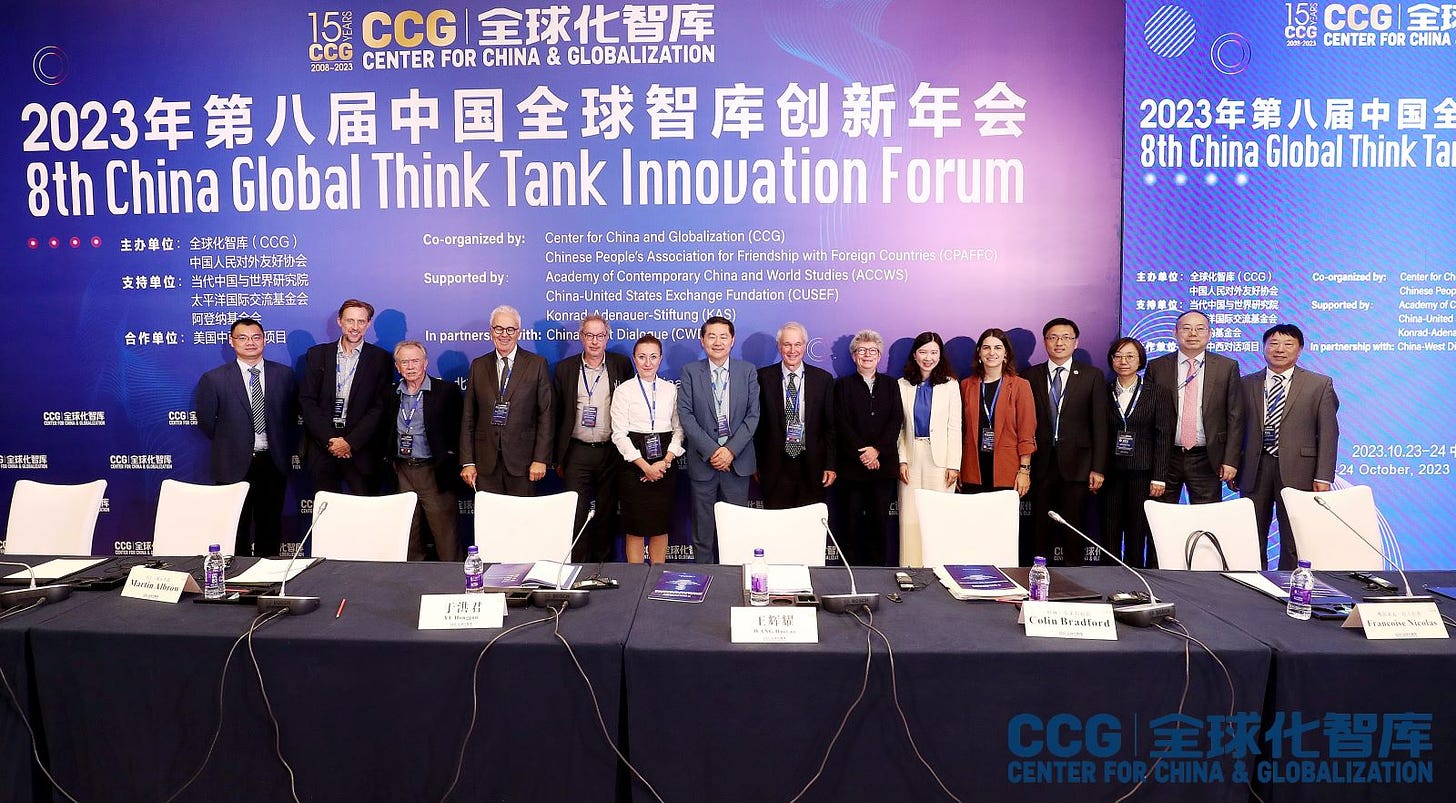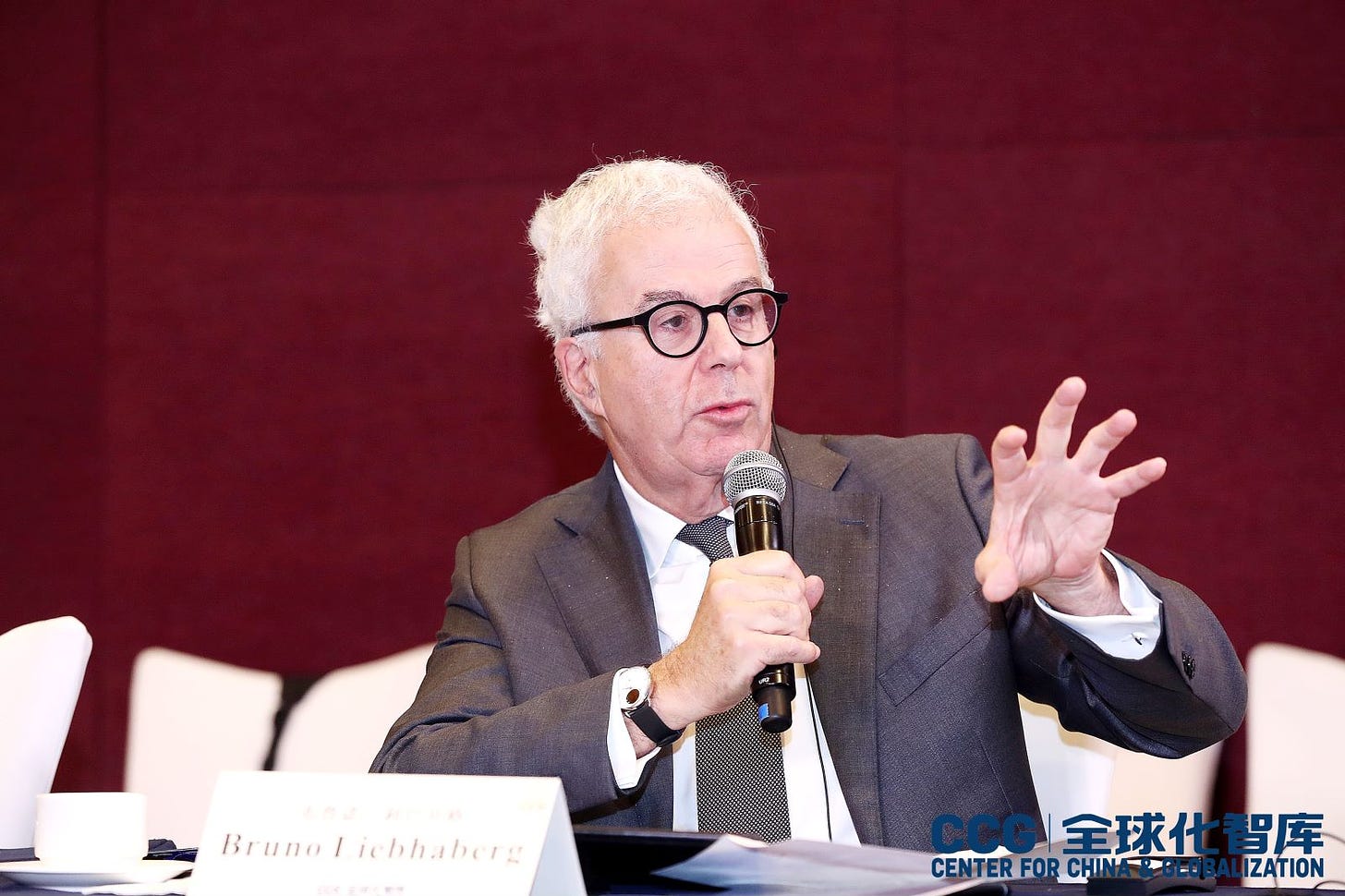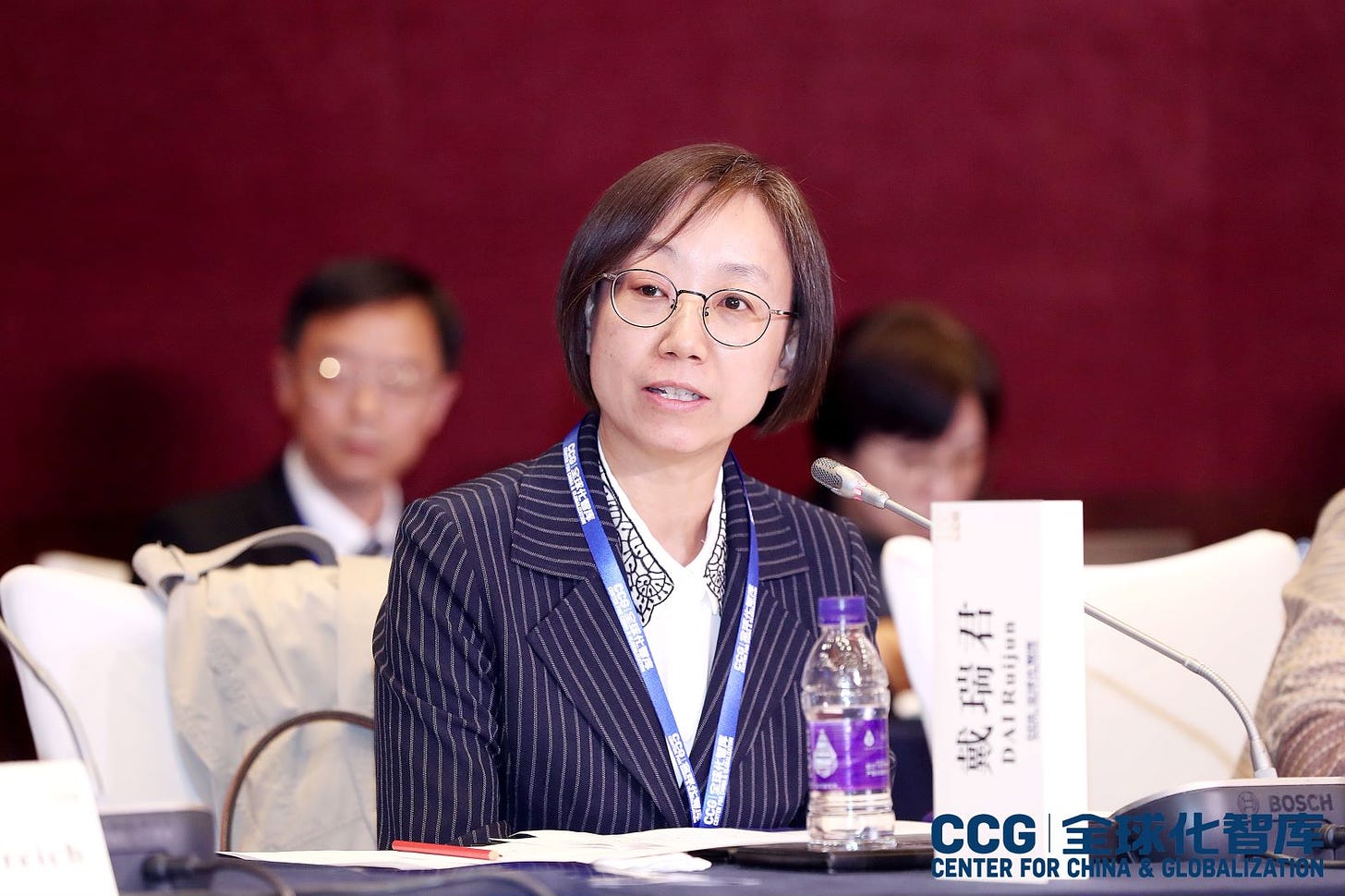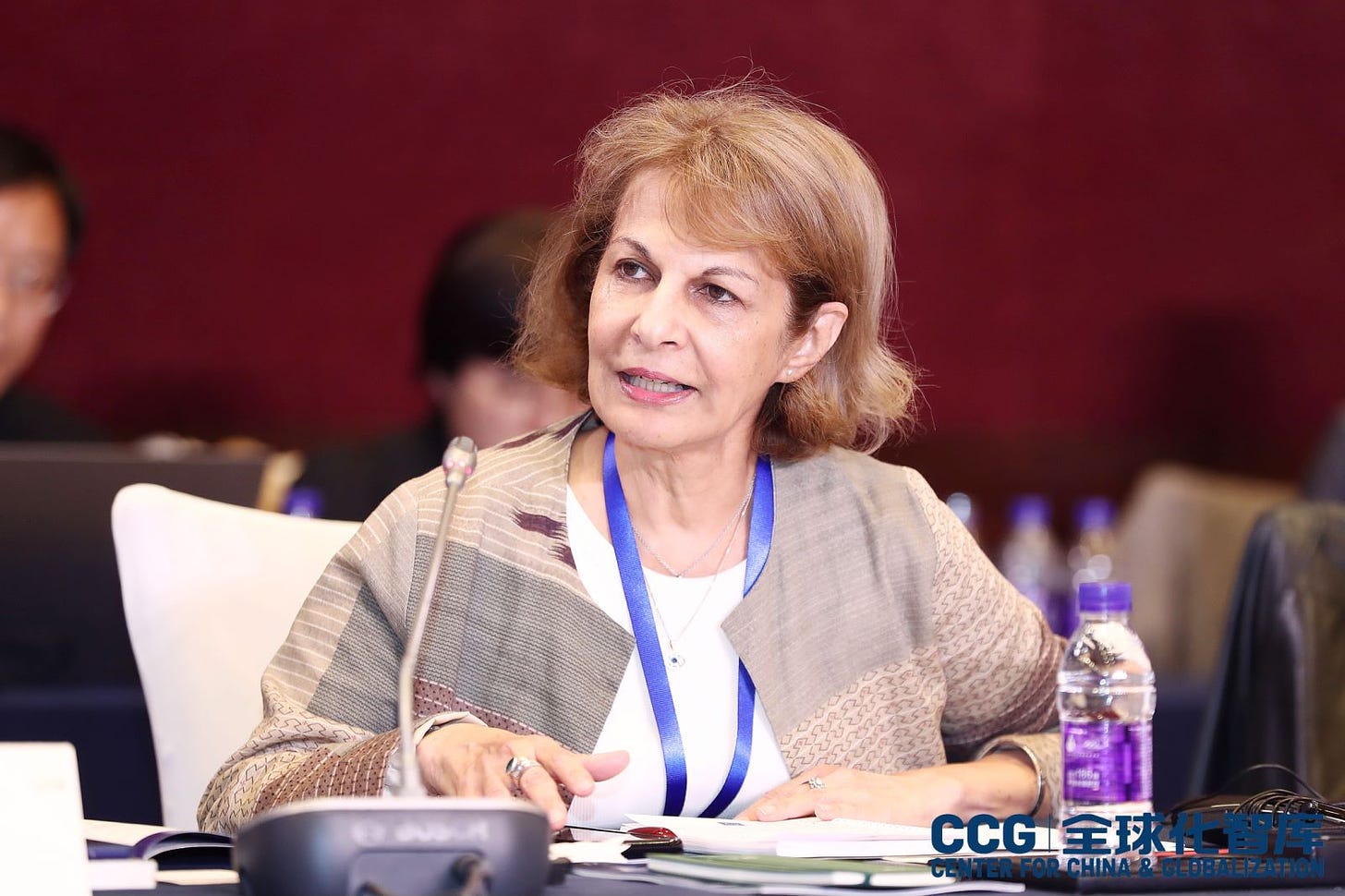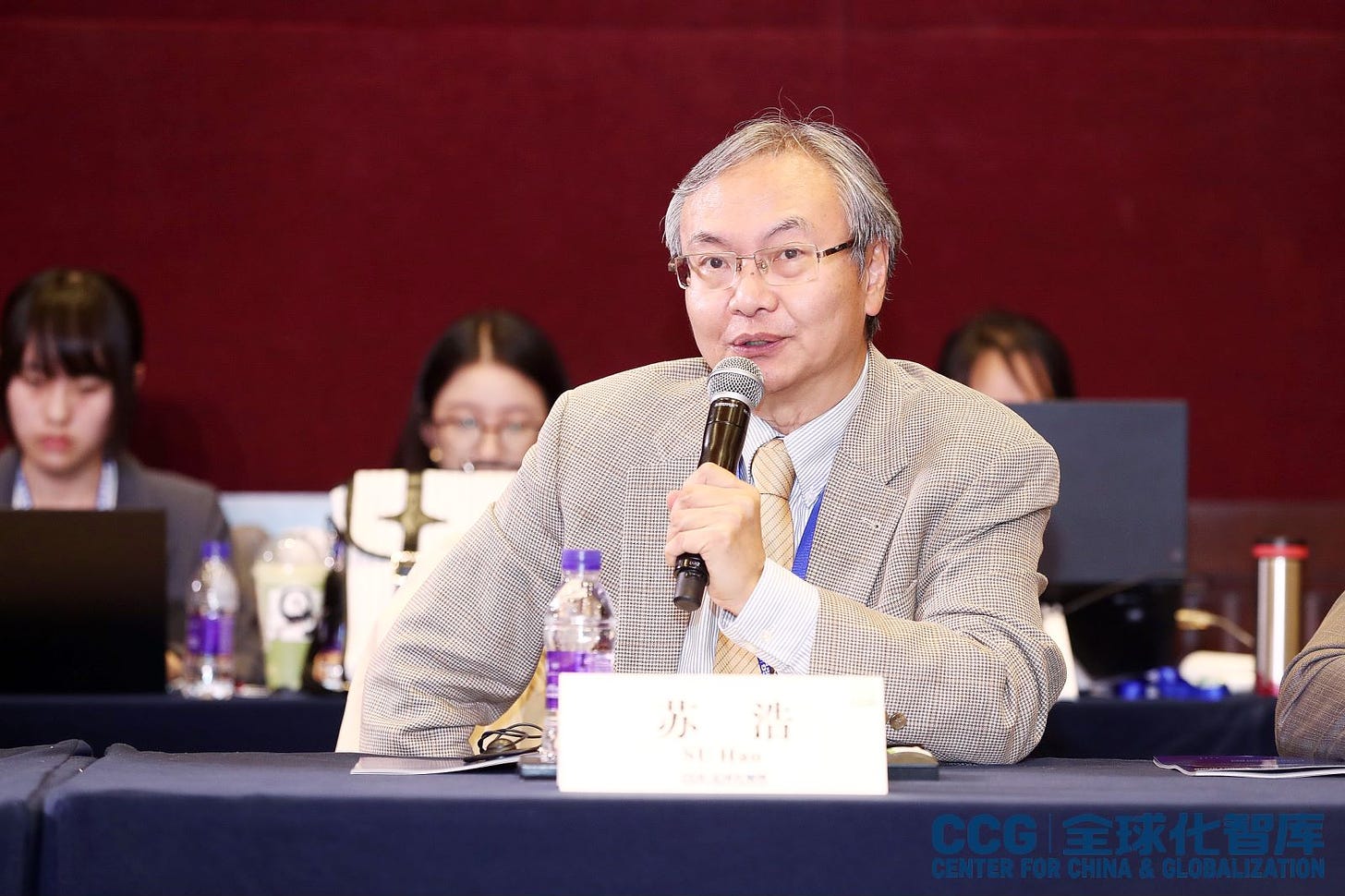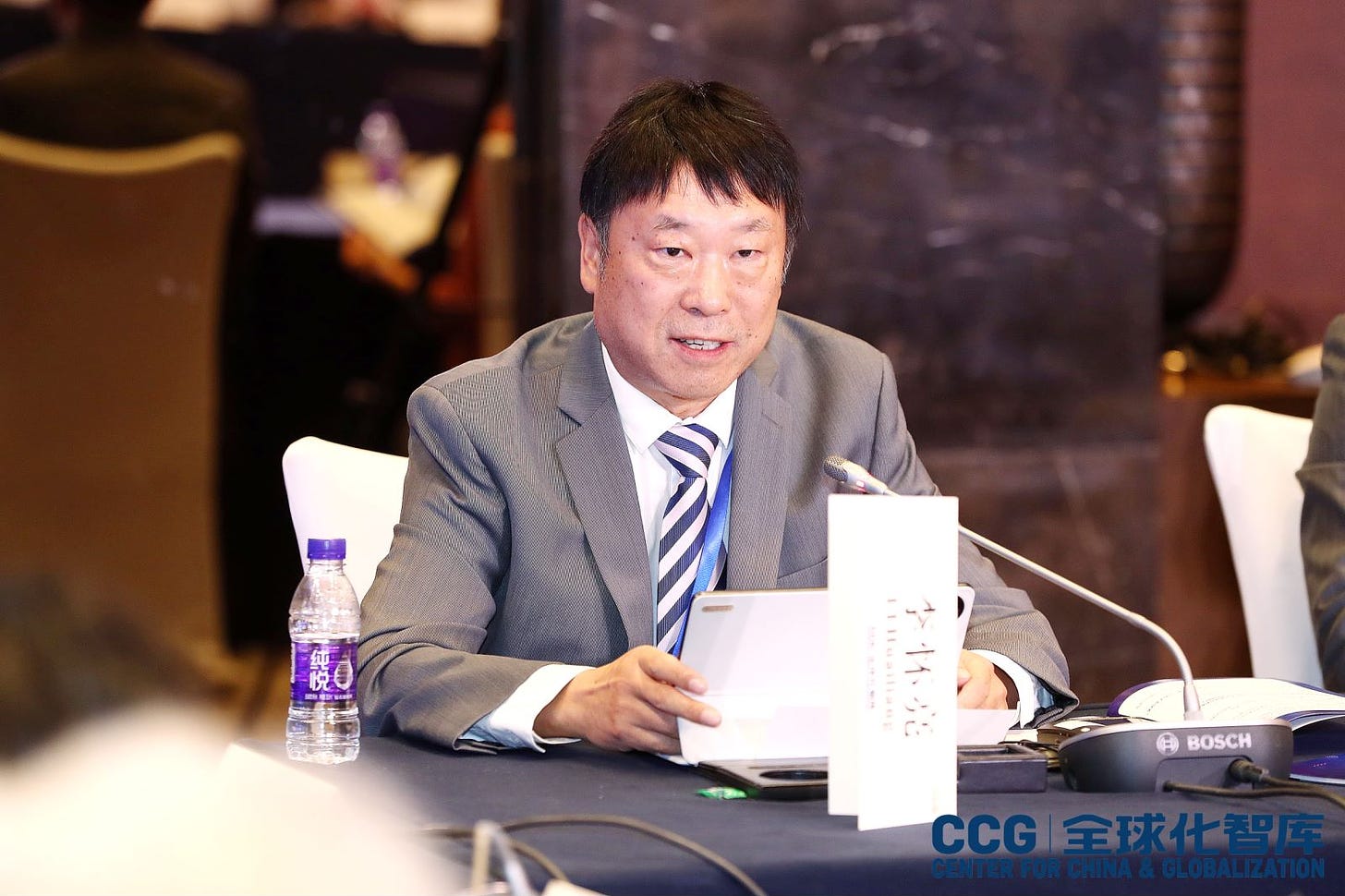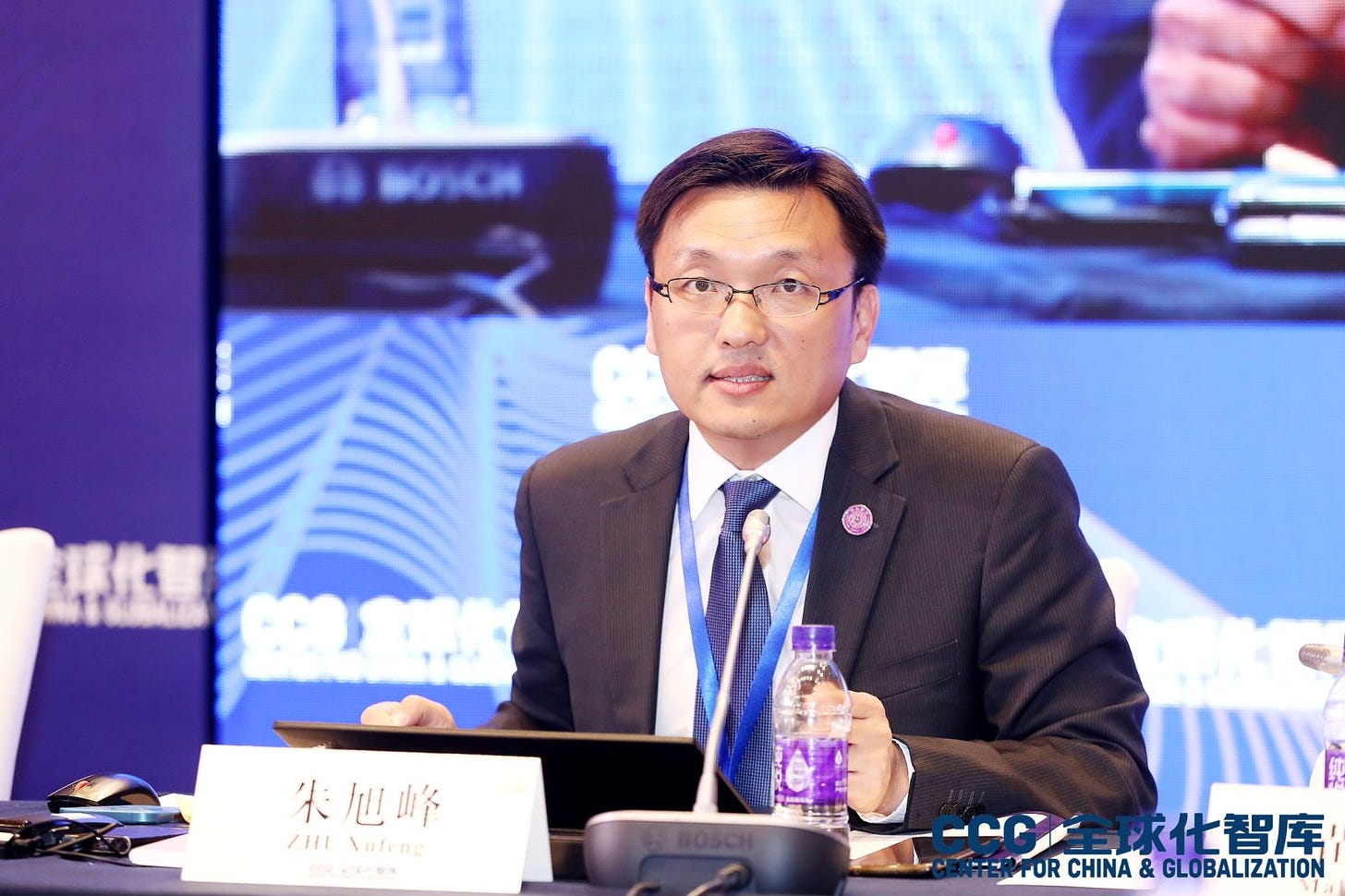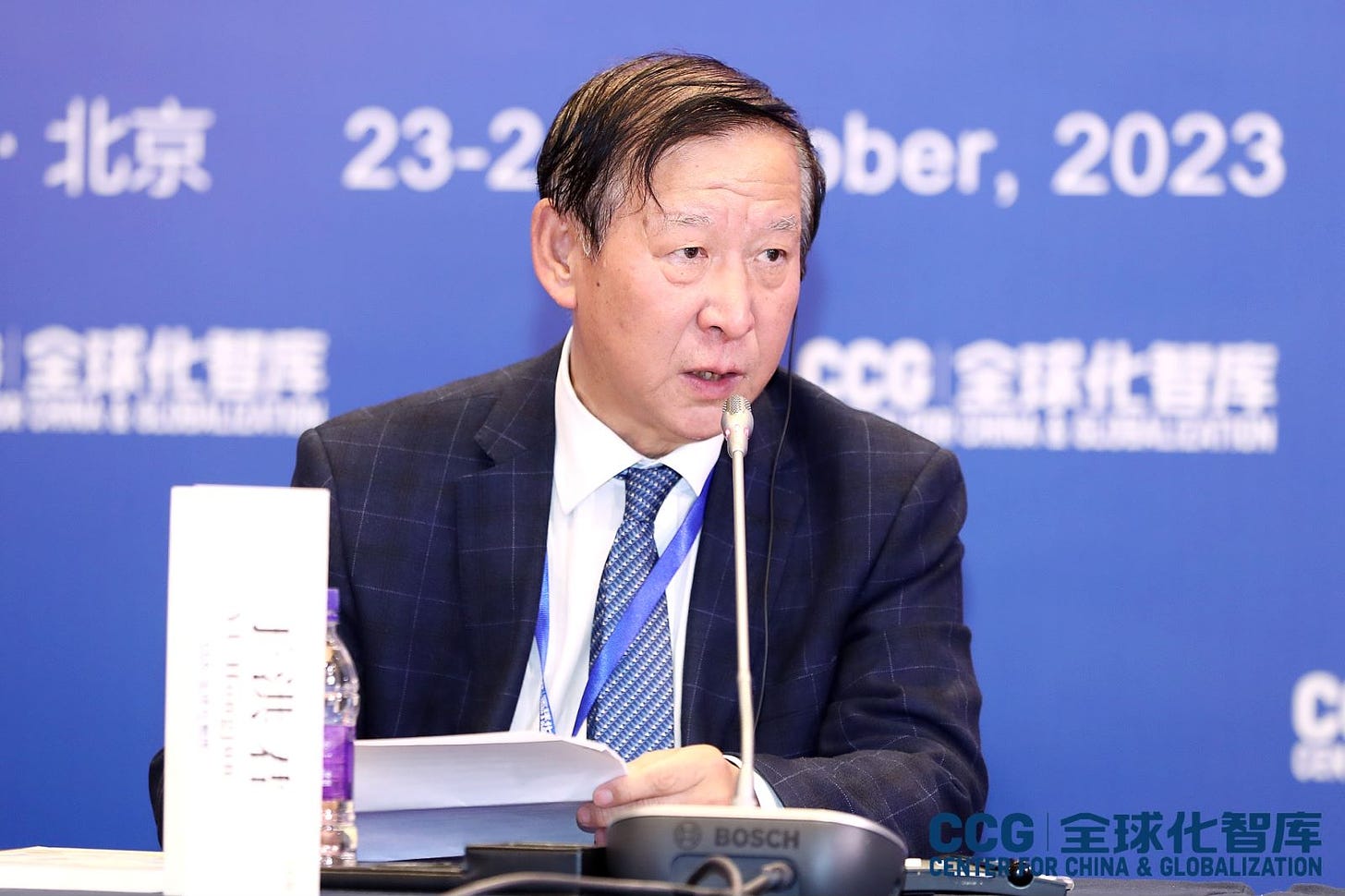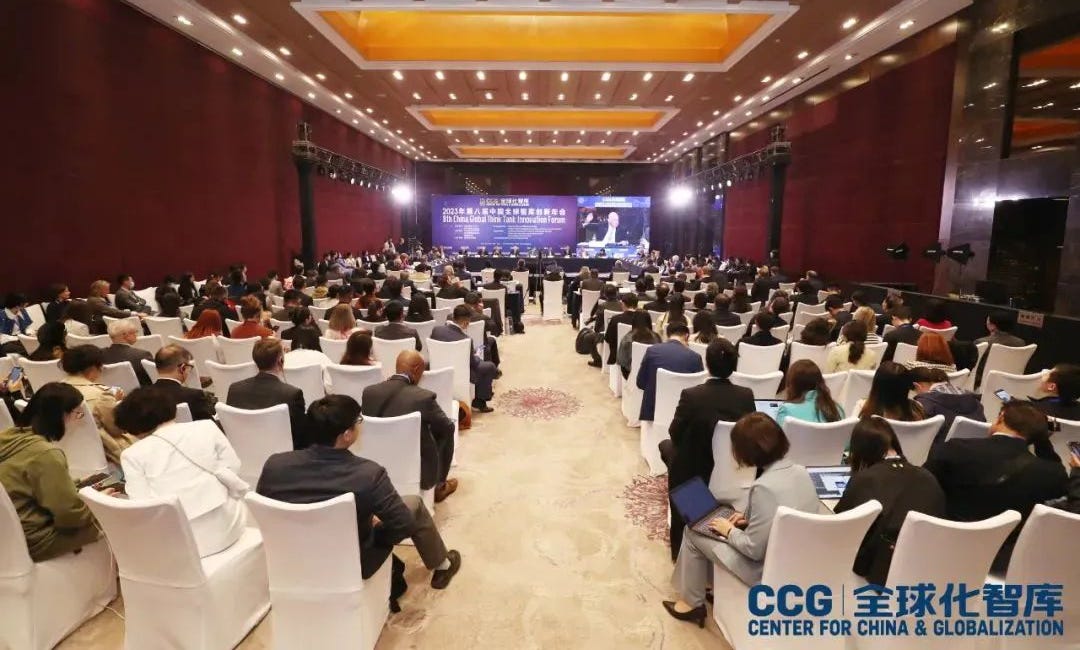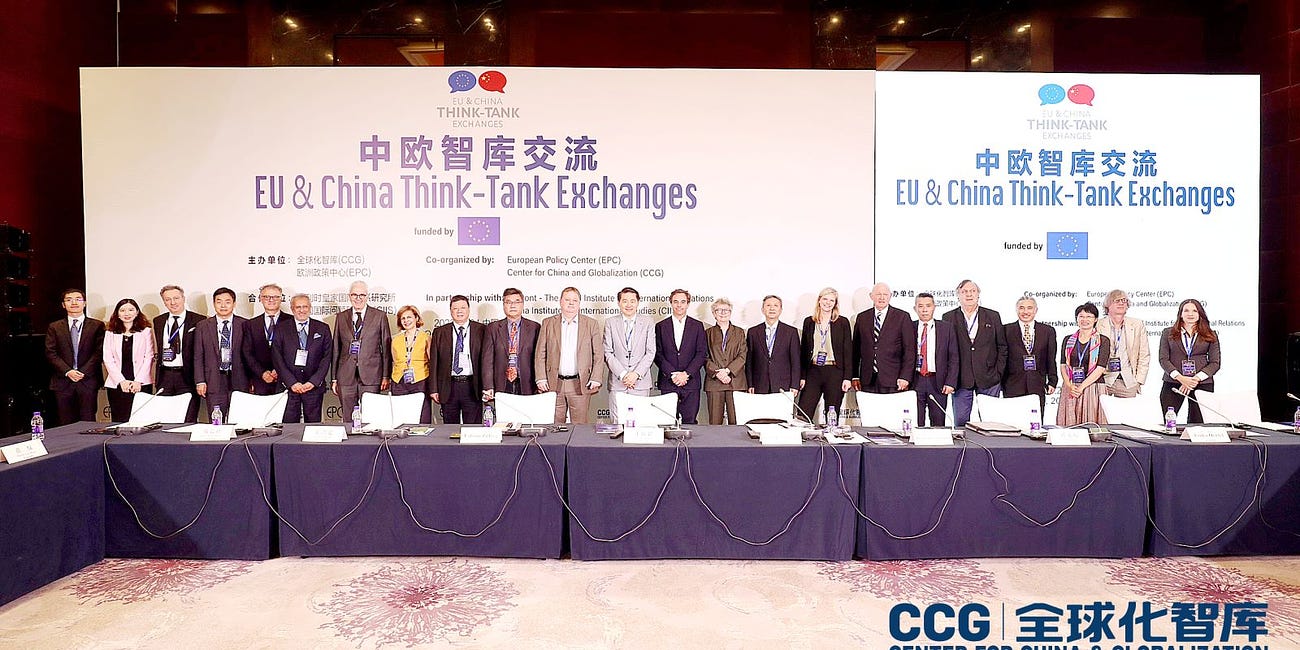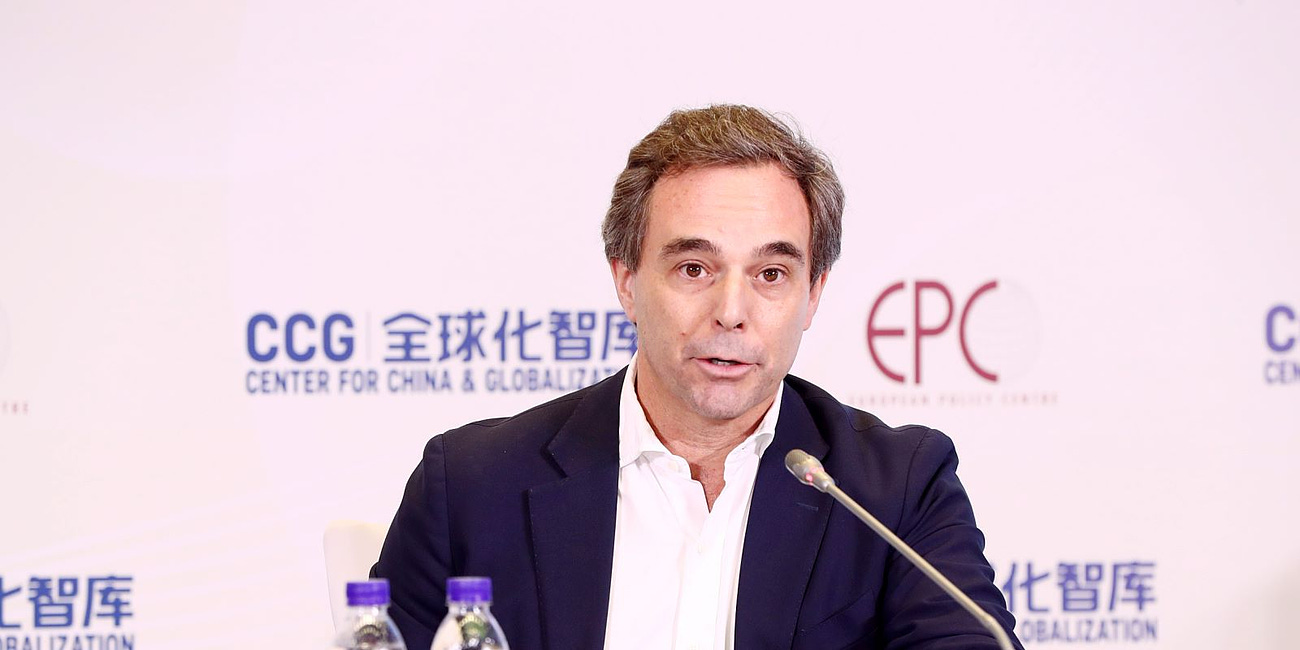Part I: International Norms and Global Engagement Platforms
Bruno Liebhaberg, Francoise Nicolas, DAI Ruijun, Shada Islam, SU Hao, LI Huailiang, ZHU Xufeng, TU Xinquan, YU Hongjun,
Hi, this is Jia Yuxuan at CCG. I am pleased to bring you Part I of the transcripts from the concluding roundtable of the 8th China Global Think Tank Innovation Forum, Oct. 23., themed "International Norms and Global Engagement Platforms".
The forum was organized by the Center for China and Globalization (CCG) and Chinese People's Association for Friendship with Foreign Countries (CPAFFC), supported by the Academy of Contemporary China and World Studies (ACCWS), China-United States Exchange Foundation (CUSEF), and Konrad-Adenauer-Stiftung (KAS), in partnership with China-West Dialogue (CWD).
The full video is available on YouTube. It was also broadcast online by CCG and remains available in China both in English and Chinese.
This transcript covers 9 speakers:
Bruno Liebhaberg, Director General, Centre on Regulation in Europe (CERRE)
Francoise Nicolas, Director of Center for Asian and Indo-Pacific Studies, French Institute of International Relations (IFRI)
DAI Ruijun, Director of the Department of International Human Right Law at Institute of International law, Chinese Academy of Social Sciences
Shada Islam, Senior Adviser, European Policy Center
SU Hao, CCG Non-resident Senior Fellow; Founding Director of Center for Strategy and Peace Studies, China Foreign Affairs University (CFAU)
LI Huailiang, Dean, Institute for a Community with Shared Future, Communication University of China (CUC)
ZHU Xufeng, Dean of School of Public Policy and Management, Tsinghua University
TU Xinquan, Dean, China Institute for WTO Studies, University of International Business and Economics (UIBE)
YU Hongjun, CCG Advisor; former Deputy Minister of the International Department, CPC Central Committee
Please note that this transcript is transcribed by CCG from the audio and video recordings and may contain errors. It hasn’t been reviewed by the speakers.
Bruno Liebhaberg, Director General, Centre on Regulation in Europe (CERRE)
I would like, indeed, to talk for 2 minutes about the link from perhaps the limits to pluralism, and how do we move from the limits to pluralism to international norms and standards, which I think is the topic of this session.
We agree that pluralism is about respect: respect for each other's identity, values, culture, and collective preferences. But one, and it's clear that the fact that you, or I say anyone, is different from me, is not a good reason not to be in business with him. However, there are limits, and the limit today, for instance, is respecting the integrity of a sovereign country. And this has immediate consequences at the international level. I know that you talked about Bali. I wonder whether you were talking about Bali or Delhi. I think it was Delhi. You talked about the communique that you read.
[Colin Bradford: It was Bali. Bali in November 2022.]
Okay, so I'm talking now about Delhi, September 23. And you could see that we tried with our project on the global governance of the digital ecosystems. We tried to push the concept of a global digital board, which would be an inclusive body, where governments, industry, NGOs, civil society would try together to identify the areas on AI, on data, etc., where there are conflicts and it's difficult to move forward. We were blocked because a number of major players told us: "Sorry, Bruno, G20 is not the right forum for that."
So, we went backward, and that is how we had G7, and G7+, G7 plus Hiroshima, which is a way to be as inclusive as possible, not to limit the governance of the world to a limited number of rich countries, but to try to widen it. Though of course, we know that it's not wide enough; there is a limit to it, but it's already an attempt to move forward. So, my point would be, despite the global challenges that we have mentioned, and we could have added a number of others, health for instance, it's clear that we need to concentrate, and that perhaps is the way forward, to concentrate on the strategic issues on which each country cannot afford not to engage. And that's basically, as Henry has mentioned, what's happening in climate. Climate is a good example where we managed to move forward in the right direction.
Now, on digital, we have a number of initiatives, in fact, a myriad of initiatives on AI, and we see that some of those are within the G7+ forum. And I'm happy to see that the UK has taken the initiative of inviting China to the conference that they're going to organize in September. So I think the only way is to manage our differences, to make them coexist. But again, let's not forget that there are limits, because a number of our countries are subject to public opinion. They need to be reelected, and this is something that we also have to take into account. Thank you.
Francoise Nicolas, Director of Center for Asian and Indo-Pacific Studies, French Institute of International Relations (IFRI)
I would like to pick up on the points that Henry made, at least two of the three points that he made. And I would be, I guess, a little bit negative. I'm sorry for that. I'll note a caution, which goes a little bit in the same direction as what was said right before.
On climate, I agree with you that it is "the thing" that everybody mentions as the possible area for cooperation. That's the obvious one. The problem is, I think that it is easy to say; it is slightly more complicated to act on climate. There are a number of declarations, but then to walk the talk is slightly more complex. And one problem I see, where it goes to climate, is that you bump into economic interests very quickly, even about climate. If you look at what the US is doing with the IRA. IRA is to help the ecological transition in the US, but then it clashes with other countries' interests. The same thing for the anti-subsidy investigation that the EU is launching. Well, if you exclusively think about climate, you may think that it's a good thing to have cheap electric vehicles coming from China. But we do not see it exactly the same way because of economic interest, because the car industry in Europe is huge, and we don't want the car industry to disappear. So, OK, we agree on climate. We agree that something should be done about climate, but very, very quickly, national economic interests arise, and this makes things quite complicated. So that's my first point on climate.
The second thing, about infrastructure. So, there are two things I would like to say about infrastructure. Well, the first thing is that infrastructure, at least as far as the digital dimension of it is concerned, is really a package. So, when you have competition, I agree with you that competition may be healthy in infrastructure, that's good. We have Global Gateway, Belt and Road, Build Back Better World, etc. That's good and healthy. The problem is that very often, together with hard infrastructure comes soft infrastructure, standards, norms. And so when you have competition in hard infrastructure, you also have underlying competition in soft infrastructure, in norms and standards. So that may make things slightly more complicated than what we think at first. So that's the first point on infrastructure.
The same thing about the digital realm; it was rightly said before that norms and standards reflect national preferences. I agree with you. And if you look at what digital governance looks like in different parts of the world, they reflect very different philosophies. We have, basically, three digital realms: the EU one, which is more people-centric, I would say, the US one, which is very much big company-centric, and the China one, which is control-dominated. And so, these are three very, very different approaches. And so, it will be quite difficult also to reconcile these various approaches. So, on digital, I don't see much scope for cooperation, at least for easy cooperation. Well, I guess I'll leave it here. And sorry for sounding so negative, but I think we have to be candid and realistic and not naive about the possibilities for cooperation.
DAI Ruijun, Director of the Department of International Human Right Law at Institute of International law, Chinese Academy of Social Sciences
I would like to start with one of the keywords of the Charter of the United Nations, that is human rights. and it is also one of the three pillars of the United Nations. And after that, I would like to try to explore some convergence, if there are some we could work together.
And as for human rights, I think many people may believe they are based on norms stem from the Western civilization, but actually it is not the whole picture. And as we all know, the Universal Declaration of Human Rights, which was adopted in 1948. This year is the 75th anniversary of this document. And this declaration, it's considered as the cornerstone of international human rights law, and it embodies, actually a global moral consensus on human rights. Drafters of this declaration came from both West and East, including China. And the Chinese representative, Dr. Zhang Pengchun, or P. C. Chang, he was the vice-chair of the drafting committee, drafting team of this declaration, and he had successfully incorporated the confusion philosophy into this declaration. Besides Mr. Zhang, there is still another Chinese scholar named Luo Zhongshu, and he had also made some contribution to the birth of international human rights law. Actually, he participated in a survey which was carried out by the UNESCO in around the 1940s to assist the draft of the Universal Declaration. And Mr. Luo also propose some ideas of the human rights philosophy in China. And because of the time limit, I will not go into detail of his contribution, but most of his contribution, or his proposal, and got positive response in the later international Bill of Human Rights. So studies have already showed that the source of international human rights law are embedded in various civilizations, and the Western view of human rights is only a local discourse. although it is very influentious. therefore, the Universal Declaration of Human Rights is proclaimed as a common standard of achievements of all people and all nations.
Actually, I would like to mention another case, a recent case. It is the 54th session of the Human Rights Council, which was concluded a few days ago. And during this session, a resolution initiated by China and some developing countries, named Promoting and Protecting Economic, Social and Cultural Rights in the Context of Inequalities, was adopted through consensus. Why is this case special? Because firstly, this resolution was adopted by consensus, not by vote. Actually, this is rare in the history of Human Rights Council. because in the past, whenever there is a resolution proposed by China or some developing countries, the Western countries, especially the United States and the UK, would oppose it and ultimately put it to a vote. But this one was adopted by consensus. And secondly, because this resolution is related to the rights of economic, social, and cultural rights. but the EU and the US clearly express their willingness to join in the consensus. This is also rare, because, at least for the United States, is not yet a state party to the Committee on Economic, Social and Cultural Rights. And the United States is always challenging the human rights attributes of economic, social, and cultural rights. So, this adoption of this resolution, maybe, to some extent demonstrate that there might be some convergence, or common sense between the West and East, between the developed and developing countries, even in today's conflict and confrontation era, to reach some consensus in the area of human rights.
at last, when it comes to exploring some convergence beyond the climate change, I think maybe some topics in the area of human rights, such as equality and non-discrimination, protection of rights and freedoms of vulnerable groups, or not let anyone to left behind, especially in the digital age might be some convergence. Thank you.
Shada Islam, Senior Adviser, European Policy Center
Thank you very much for giving me the floor. I'm really, A, very delighted to be here, Henry and Mabel, thank you. And B, to speak after you. Because what I'm going to say is a bit similar, but I'm going to put it a bit differently. I am a senior adviser at the European Policy Center, and I'm a visiting professor at the College of Europe in the Natolin campus. I know that the world likes formality, structures, hierarchies, and a world that is patriarchal in essence adores formality and officialdom. But I think in the world that we live in today, and we're seeing it in our streets of Europe and across the world, there is a real desire for informality and to work to tackle our challenges, not through official structures, but through informal channels. And that is why I think this multipolar world, Colin, that we're talking about, and that you call the shifting coalitions of consensus. And I say often in what I write and what I tell my students, is a mix-and-match world; it's an à la carte world. Countries are not being pushed into silos and channeled into binary choices. They're not doing it. It's spontaneous. And we're seeing it now, and we need it now. We need it now in the Israeli-Palestine conflict; we need it now in Russia and Ukraine. We've seen countries coming in. It's Turkey, it's Qatar. The United States and China cannot handle it; the European Union cannot handle it on its own. So, we need these alliances. We need these partners to come in at this point. So, this is the first thing: that it's an informal world. This multipolar world is going to break away from the constraints and, I would say, the shackles of institutions where countries will have to work, whether they're Global North or Global South, collective West, global South; they'll have to work together in informal alliances. And these G20 are good for the moment, but it has to break up into smaller groups, minilaterals, plurilaterals, à la carte, I would say.
And the second point that we're seeing now is the importance of young people. Young people are very, very important. I think we have to break away from this generational divide that exists as well, where the policies are being made by elderly gentlemen, if I may put it that way, whereas the young people, as we're seeing in the streets, want peace and reconciliation. I myself am not very young, so I'm saying this, knowing what I'm saying. So the three areas where I think we need to work, of course, are climate change. And my friend Francoise has said very clearly the dangers and challenges there. But I think sustainable development goals, SDGs, I mean, I know that we all sort of talk about the SDGs and then put them away and say, okay, that's done, but those are essential if we're going to build a more equal world, if we're going to protect the vulnerable, if we're going to protect education, health, etc. So I would say multipolarity, in many ways, is a challenge, but I would say that it is also a blessing. It's a reality, and we have to work with it and not try to impose structures on it, which actually will not be of benefit to us. Thank you very much.
SU Hao, CCG Non-resident Senior Fellow; Founding Director of Center for Strategy and Peace Studies, China Foreign Affairs University (CFAU)
Now, I would like to give three points in my presentation. First, I do think that we should go beyond the ideological politics. Unfortunately, when we look around the world, we have been divided into different camps of ideology, right? Democracy or non-democracy. But I think that these kinds of patterns make the world get into a tragedy. You know, patterns like the Cold War period, and now we're heading closer towards the new Cold War. That will be a real problem. But I do think that all of us would like to go beyond that kind of Cold War mentality and patterns. That's the reason why we all sit down around the table from all over the world. So, I think that we should do something to go beyond the power politics, the power police, and ideological politics.
And the second point, I would like to say that this world has also been composed of plural cultures and civilizations. Of course, we are different, right? But regarding the background of culture, nobody, not even a country, can take the opposition against each other. So, I do think that our American friends would like to respect Confucius, right? And our Chinese would like to respect the Western Jesus Christ, or other philosophical key scholars in the Western Academy. So, I think that, regarding the world, even if the world has differences between us because of the background of culture, we should share this culture. That's the reason why our Chinese would like to set a value, which is a civilizational value, not just a critical value. Our Chinese love the freedom and democracy that originate from the Western academy and civilization. And I do think that our Western scholars also love Chinese civilizational values.
So, the third point, I would say that maybe we should reshape a new style of politics. I would like to use a word called civilization politics. Go beyond ideological politics and power politics. We know that in the 19th century, power politics caused so many wars among our human society. And ideological differences caused the Cold War in the 20th century, and now in the 21st century. We should try to move ahead towards the civilization politics, and mean all countries based upon our own civilization. For example, like in East Asia, China, Japan, South Korea, or some countries in Southern Asia, will belong to the East Asian civilization. We should have our own community based upon our civilization value. Of course, the United States is a representative of Western civilization. That's good. China respects American civilization, or Western civilization. So that's the reason why I would say that East and West could sit down together, like this round table. And even I would like to propose to Huiyao, maybe next year, if you have set the themes for this dialogue, maybe give a word like this "We Forum." "We Forum" means West and East. So West and East. We also belong to humanity, right? And we share our original global civilizations. And also, even though we have different civilization backgrounds, we can sit down together as human beings. So, the We Forum could unite the East and the West for our human activities, like anti-globalization and like climate change in the global community. Okay, that's my point. Thank you.
LI Huailiang, Dean, Institute for a Community with Shared Future, Communication University of China (CUC)
Today, our topic is the dialogue between China and the USA. Really, we have one dialogue. But usually, frankly, dialogues between China and the US were not like factual dialogues. They were more like arguments. It is normal to have arguments, and arguments are not a bad thing. The debate between China and the US is basically rooted in the following three levels.
First, the interests. China and the United States are each other’s important trading partners. China and the United States share many common economic interests. If this partnership is undermined, both sides will suffer huge losses. But China and the United States also have different interests. China is a developing country, and so far, China’s greatest interest is development. The United States is already a developed country and is the richest country in the world. Development is not its greatest interest. Its greatest interest is to maintain hegemony, economic hegemony, military hegemony, and cultural hegemony. There will certainly be conflict between the two largest economies. One is for development, and the other for hegemony.
Second, responsibility. There are different understandings of rules. In the past few decades, the international economic balance of power has changed profoundly. but the global governance system has failed to reflect the new changes and is not representative and inclusive enough. An important difference between China and the US is the different understanding of rules. When Americans talk about rule-based international relations, they mean a set of rules. The Chinese also speak of rules, but they refer to a different set of rules, that is, an international system, with the United Nations at its core and an international order based on international law.
The third is value. It is a different understanding of political systems and political values and development path. There are fundamental differences between Chinese and American political values. Americans consider their nation as a city on a hill, and the world should look up. The political values of the United States are universal values, and the whole world should adopt such universal values. Any government that does not conform to their democratic model is authoritarian. What Americans understand as modernization is westernization. The Chinese believe that countries have different national conditions, different cultures, and different histories. Countries have the right to choose different paths of development.
The debate on the three levels will continue for a long time and will not go away anytime soon. And there is no need to rush to complete agreement. Our mission is to transfer argument into real dialogue. How? It is a good way to seek truth from facts. More inclusiveness, more constructive, more mutual respect, more equality, more negotiations, less prejudices, less speaking from the position of strength. Treat each other as equals, respect each other, and then we can hear each other. Thank you.
ZHU Xufeng, Dean of School of Public Policy and Management, Tsinghua University
My name is Zhu Xufeng, from Tsinghua University, Dean of the School of Public Policy and Management, and the executive director of the Institute for Sustainable Development Goals. Today’s sessions, the topic is the international norm and international cooperation. I think for international organizations, the most inclusive and authoritative international organization is the United Nations, which plays the most important role in resolving international conflicts, economic, social development, and sustainable development in the world. The UN 2030 agenda for Sustainable Development Goals was adopted in 2015, includes 17 goals across economic, social, and environmental domains and serves as an important document for global development. Since the adoption of the 2030 agenda, countries have made significant progress in implementing sustainable development goals. Some goals have already been resolved, achieved, such as China’s early completion of poverty alleviation tasks by 2020. In addition, the international community is strengthening cooperation and coordination to jointly address global challenges.
However, in the process of implementing the United Nations Development Agenda, there are also a lot of difficulties and challenges. First, some developing countries lack the economic, technological, and human resources to implement the sustainable development goals. The second is some developing countries still face internal and external imbalances in political, economic, and social aspects. In addition, the outbreak of the COVID-19 pandemic and the Russia-Ukraine war, in particular, has strengthened the imbalance among the countries, especially the LDCs, Least Developed Countries that have just lifted themselves out of poverty, have rapidly returned to poverty. So, in terms of China, Chinese President Xi Jinping proposed the Global Development Initiative in 2021. The initiative proposed that developing countries should strengthen their capacities to achieve economic, social, and environmental coordination and development and eliminate poverty. The GDI is of great significance for promoting the implementation of the 2030 agenda for SDGs globally. First, the GDI provides important support and guidance for the LDCs to achieve sustainable development. This initiative emphasizes the importance of poverty alleviation, promoting economic growth, improving education and health levels, and protecting the environment, and proposes significant action plans and goals. Second, the GDI has received widespread support from the international communities, including the United Nations, governments of countries, and international organizations and non-governmental organizations. The establishment of a group of Friends of the Global Development Initiative in 2022 shows that they have a strengthened partnership. So, in summary, the GDI provides important support and assistance for the least developed countries to achieve the 2030 agenda. So currently, the implementation of GDI still requires joint efforts and cooperation for all parties, bridging the differences in preferences in opinions and politics that exist among different countries, and further promoting the achievement of the sustainable development agenda. In the future, we need the international community to continue to strengthen cooperation, jointly promote the globe to achieving sustainable development goals. Thank you.
TU Xinquan, Dean, China Institute for WTO Studies, University of International Business and Economics (UIBE)
Thank you, Chair. I'm Tu Xinquan from the China Institute for the WTO Studies, UIBE. So I'm a WTO man, not a tariff man. But to be honest, I'm afraid that the effective functioning of the international system does not depend on rules or norms, but on the leadership of the hegemony or the cooperation of hegemonic states. In the case of the world trading system, since the 2008 global financial crisis, the US has gradually lost its confidence and interest in sustaining the multilateral trading system to pursue and defend its economic interests. The shrinking of US manufacturing, the rising internal income inequality, the narrowing gap between the US and China are perceived to be the outcome of the multilateral trading system, which offers more opportunities to China’s rise.
The permanent goal of the US as a hegemony is to maintain its hegemony permanently. Although China repeatedly claims that it is not intending to take over the US position, the US doesn't believe it and even heightens its suspicion over China's hidden ambition or conspiracy. At the same time, China also believes that currently the US will take whatever measures to contain China's development and sustain US diplomacy. So the fundamental dilemma for the current world is that there is neither absolute hegemony nor cooperative powers. Therefore, we should not expect the international system could function effectively as in the first two decades after the end of the Cold War. We have to live with this reality that the two competing powers have deep mutual distrust in each other. In my opinion, the best hope for now is to keep the great power competition peaceful as much as possible, both economically and militarily. In terms of economic competition, we should encourage and urge the two major powers to generally stick to the existing WTO rules as well as other international rules and at the same time to reach interim deals about some controversial issues such as national security. Most importantly, the two powers should give each other more policy space to take certain restrictive measures to defend their essential security interests and agree not to take tit-for-tat retaliation for their domestic political purposes. Both sides should exercise restraint in initiating dispute settlement cases regarding national security, since the two sides' ignorance of the WTO rulings will even hurt the authority of the WTO.
Secondly, the two powers are trying to promote more active industry policies in certain sectors. They could walk along with other interested parties to reach temporary or permanent clarifications about the agreement on subsidies and countervailing duty measures, giving more policy space to each other to make and implement their industry policies, especially those related to environmental protection and climate change, which could produce global positive spillovers. Moreover, if economic theories are right, that subsidies won't work finally, just let all of them fail. Domestic politics will punish those incompetent governments.
To conclude, for now, we would better adopt a kind of appeasement policy, with looser constraint on each other, and give more time for both sides to adapt to the evolution of the global power structure. Thank you.
YU Hongjun, CCG Advisor; former Deputy Minister of the International Department, CPC Central Committee
So maybe I'll make an exception. I'll be speaking in Chinese. Thank you for your invitation. I am a CCG advisor and have been engaged in international studies for a long time. I've been deeply inspired today. I want to talk about how to strengthen international norms and increase international cooperation. I think we all feel that we are at a crucial moment. There are a lot of deficits in governance, in development, and we are lacking in cooperation platforms. And the existing international norms and international rules and relations have been challenged, and China's role in the world has also been misunderstood to a great extent. Actually, China is working hard to become an advocate of respecting international norms. Since the end of the Cold War, the world is developing toward Multipolarity, and economic globalization has also experienced a lot of twists and turns. The international community hopes that the big countries will show more responsibilities in international governance to ensure that we will build a community of shared future for development and for a common destiny. And Chinese leaders, ten years ago, already said that in dealing with other countries, our goal is to find common ground and promote lasting peace and build peace and prosperity in the world. So to follow international rules and uphold international governance and promoting international cooperation are the choices made by China. Our goal is actually to find the convergent points among different countries and share responsibilities with different countries. And through the universally accepted approaches, we will work together to find a way for common growth and development.
Second, actually, China has also made specific and practical proposals for global governance, e.g., China wants to participate in science and technology governance through increased cooperation. And second, we have taken the initiative to make good use of international initiative resources, to participate in the international innovation networks and build our capacity for rulemaking in the world. And to participate in environmental governance, we want to build good ecology in the world, and we want to ensure that our actions are environmentally friendly, and we want to find the solutions to sustainable development. And China wants to participate in security governance. We hope that we can combine our security with the common security of all mankind. That is why I have been the most active in the international peacekeeping missions. We are engaging in the fight against terrorism, we are engaging in the cooperation against human trafficking, against drug trafficking, etc. So those are all good examples.
Finally, also want to say that China has always been following the spirit of openness and inclusiveness. We are not engaging in geopolitical little camps or blocs. We are against parapolitics, cold war mentality, or bloc politics. We believe that the developed countries are not in a position to dominate world affairs. Global governance should reflect the rights and needs of all parties, so that we will build consensus for joint actions. So, without cooperation, there will be no governance. And China has never denied the necessity for developed countries to participate in international governance. We want to work together with the world to promote global governance, e.g., China, the United States actually have a lot of shared interests in global governance. That is something made clear by President Xi Jinping. To be together in this process will enable us to make good use of our advantages and work together to address global challenges. And China also will make a pioneering effort, take proactive actions towards this end. And President Xi has also made vivid descriptions about this Chinese commitment. We want to build efficiency. We want to fight corruption. And that is also an important requirement from the G20. Actually, G20 is another important platform for addressing global challenges. We hope that it will play a bigger role. In recent years, we have heard a lot about the three global initiatives. They are in line with the BRI actually. They are all aimed at expanding third-party cooperation. Our purposes are simple: We want to ensure equity in development, ensure reliable security, expand our cooperation. And to implement these new initiatives, we will build more platforms for cooperation for the world. We hope that the whole world will take a more active part in the development of all those platforms. That is all from me. Thank you for listening.





